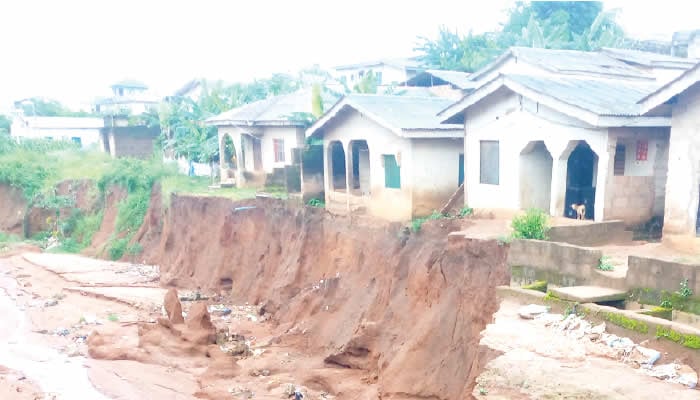
Our reporters
About 27 states, including the Federal Capital Territory, have recorded delays in the implementation of ecological projects that were approved since 2017, despite several billions of naira disbursed as funds.
Details of the ecological funds were contained in a report obtained from the Ecological Project Office’s website.
PUNCH Healthwise reports that the Ecological Fund, established by the Federal Government of Nigeria, aims to address diverse environmental and ecological challenges faced by communities nationwide.
These ecological problems include soil erosion, landslides, flooding, drought, deforestation, desertification, and pollution.
It was indicated that the FG disbursed N6.5bn ecological fund in March alone, according to data obtained from the Federation Allocation Account Committee.
The affected states are Jigawa, Adamawa, Anambra, Cross River, Kebbi, Katsina, Kaduna, Akwa Ibom, Nasarawa, Ebonyi, Lagos, Benue, Kogi, Ogun, Osun, Bauchi, Delta, Niger and Gombe states.
Others are Edo, Kano, Yobe, Enugu, Sokoto, Bayelsa, Ondo states, and the Federal Capital Territory, Abuja.
It was noted that out of the amount, Delta State got the highest amount, N19.2bn, followed by Bayelsa State, N2.8bn, then Cross Rivers State, N645.3m.
Between 2015 and 2017, Nigeria witnessed significant efforts to tackle ecological challenges through various projects.
However, several of the projects initiated by the FG remain incomplete despite substantial investments.
Some notable examples of incomplete ecological projects across different states are the stream erosion control located at Chief Ogungbo Road, Ago Iwoye, Ogun State, which is at 42 per cent completion, while Ondo Township erosion control works, Ondo State, approved in November 2017, is at 30 per cent.
Gandu, Tukuntawa, and Zoo Road erosion and flood Control Project, Kano State and Tundun Magayaki/Cemetary/gully erosion and flood control, Sokoto South LGA, Sokoto State, are at 30 per cent.
Similarly, the shoreline protection project located at Alebiri, Bayelsa State, is at 45 per cent completion.
Mubi Flood/Erosion Control Works and River Yalzaram Training, which target flooding and erosion in Mubi, Adamawa State, are at 80 per cent completion.
The Erosion Control Works in Anambra State, which was approved in March 2017 and focuses on areas in Nda, Nnobi, and Agbor within Idemili LGA of the state, is at 70 per cent completed.
Also, Adiabo Okutikang Beach Gully Erosion Control Works, aimed at addressing gully erosion near Adiabo Okutikang Beach in Cross River State, is at a 70 per cent completion stage.
Rice field erosion/flood control projects in Bagudu and Suru LGAs in Kebbi State and the flood and erosion control of Damaturu-Balmari-Gashua Road, Yobe State, have only seen 50 per cent of work done.
Only 45 per cent of works have been done at the mitigation of flooding into Uburu Salt Lake and Rice Farms in Ebonyi State.
The OORA/AAYO River erosion control and road improvement, located at Oke-Ayo Area, Ilesha, Osun State, is at 45 per cent completion.
Erosion control works, approved in June 2017, located at Makinde Way and Environs, Idimu, in Lagos State, is at 80 per cent completion.
Tsoho Gwaram Erosion and Flood Control Project, which was approved in March 2017 and located in Gwaram LGA of Jigawa State and aimed to address erosion and flood issues in the region, is 85 per cent completed.
Erosion and flood control works in Tarka and Guma LGAs of Benue State are still at 88 per cent completion.
The Bauchi-Ningi Road Erosion Control, approved in October 2017, and the Burga-Gwammadaji flood and erosion control works are still at a 65 per cent level of completion.
The slow pace of these projects raises questions about accountability, transparency, and effective project management.
Citizens living in areas affected by erosion and flooding bear the brunt of incomplete infrastructure.
The acting Director-General of the FCT Emergency Management Department, Mr Mohammed Sabo, said the department was aware of the predictions, noting efforts to sensitise residents and barricade roads in flash flood areas in the city.
“We have the climate predictions for 2024 by the Meteorological Agency and the National Flood Outlook, and it has been predicted that there will be flash floods around FCT.
“And the normal thing we do is that we engage in a lot of sensitisation of the general public, especially for those that are living within the river-bank areas, that they should immediately evacuate and go to higher ground, especially during the rainy season commences, to avoid being affected by the flood,” he stated.
According to Sabo, for most of these flash-flood areas, the agency barricades such areas whenever it rains.
The DG explained that the FEMD would begin stakeholder engagements in May, to review previous efforts, draw up strategies to ensure the safety of lives and property in 2024 and carry out a fresh assessment of all flash-flood areas in the FCT.
Copyright PUNCH
All rights reserved. This material, and other digital content on this website, may not be reproduced, published, broadcast, rewritten or redistributed in whole or in part without prior express written permission from PUNCH.
Contact: [email protected]










